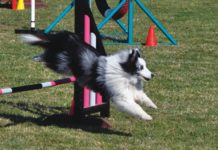Trimming a Dog’s Toenails
Even behaviors that don't lend themselves well to choice, such as trimming hair and medicating ears, can incorporate an element of choice and priming, by teaching your dog to station." To "go to station" means to to go to a specific spot where nine times out of 10 (or better yet
Why Are The Effects Of Snake Venom So Varied?
Snake venom consists of proteins, enzymes, substances with a cytotoxic (poisonous to living cells) effect, neurotoxins (which damage nerve cells), and anti-coagulants. Four distinct types of venom act on the body differently.
A Snake-Bite Survival Story
On October 25, 2013, three days before his dog's fifth birthday, Dan Owen of Helena, Montana, went pheasant hunting with his friend Doug Denler in Shonkin, Montana, 40 miles east of Great Falls. Owen's Golden Retriever, Dusty, and Denler's Brittany Spaniel, Radar, were experienced hunters.It's really desolate looking country
Are You Sure It Was A Rattlesnake?
Snakes and dogs are a bad combination in any circumstances, but it's helpful to know what venomous snakes look like, both where you live and where you might be traveling.
Appreciating Rattlesnakes
Rattlesnakes fill most of us with fear and anxiety. For many, the only good snake is a dead snake.
How to Prevent or Treat Bites from Poisonous Snakes
Thousands of dogs are bitten in the U.S. each year by venomous snakes. Ninety-nine percent of the snakes that bite them are pit vipers, whose Crotalidae family includes Copperheads, Cottonmouths (Water Moccasins), and more than a dozen species of rattlesnake. The remaining one percent are Coral snakes, native to the American Southeast and Mexican border.
Snake Avoidance Training for Dogs
Positive training methods focus on rewarding activities, and they're fun for dogs and handlers. But mention rattlesnakes and many dog owners worry that positive reinforcement isn't enough. In order to remain safe around rattlesnakes, some say, your dog may need aversion training with an electronic (shock) collar.
How to Protect Your Dog From Foxtails
trailing awns that are covered with microscopic "scales" that permit movement in one direction only. This makes them dig ever deeper into flesh
Patrol Your Property For Wasps
The insects we encountered on our walk were likely yellowjacket wasps, as they are the most likely to build ground nests. It would explain why we didn't find any stingers on our dogs. Yellowjackets, bumblebees, paper wasps, and hornets can all sting multiple times without hurting themselves. A honey-bee stinger, however, remains in the victim's skin, tearing out of the bee's body when it flies away, and causing its death a short time later.
Be Prepared for Bee Stings
Late one summer, my sister and I were walking our dogs along a groomed trail in a state park. It was the same path we had taken the day before on our vacation camping trip, but it was such a relaxing, warm afternoon that we thought we'd enjoy it again. We had stopped to take in the scenery and watch her Labrador play in the water. My Papillon was eagerly exploring whatever was within the reach of his leash. Then, without warning, my Pap began leaping up in the air and shrieking. It was horrifying! I reached for him as he continued to jump, screeching and clearly terrified. I thought he was having a neurologic fit.
10 Ways to Make Your Old Dog Comfortable
Sometimes we don't want to admit our dog is aging. We ignore the graying muzzle and scoff at the idea of a senior dog food." After all
10 Steps to Healthy Skin and a Silky Coat for Your Dog
All dog lovers appreciate seeing a healthy, happy dog, running in the sun with a glistening coat. And it's great to hear, Wow! Your dog's coat is so soft and shiny. How do you do it?" It's wonderful if you are one of the lucky owners whose dog inspires this sort of spontaneous compliment

















